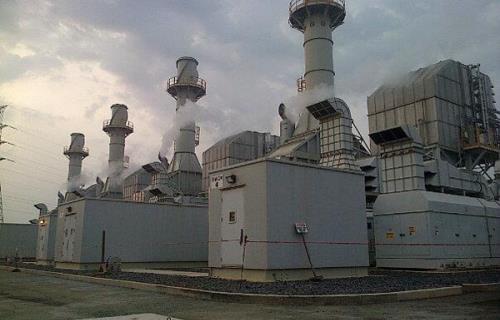The Minority in Parliament has demanded that government provides a breakdown of the $34 million it said is the cost of relocating the Ameri Plant.
A member of the Energy Committee in Parliament, Edward Bawa disclosed that government said the relocation of the deal would cost the state an amount of $34 million.
This, he said was revealed after the Mines and Energy committee met with a number of Agencies in the Mines and Energy sector over the weekend.
According to Edward Bawa, the transaction must be halted as the economy is currently facing a huge crisis.
“As a Minority, we demand the breakdown of this cost, particularly when the country is having difficulties paying salaries and servicing our debt. The Energy sector is under serious challenges and therefore such opaque transactions must be halted in the supreme interest of every Ghanaian,” he noted.
The Bongo MP stressed that “answers were not forthcoming” when the Minority demanded details of the transaction at the meeting.

According to the legislator, “the company contracted to carry out the relocation of the plant is mytilineous international trading company, the same company that was involved in the novation and amendment of the Ameri contract that almost swindled Ghanaians but for the vigilance of the Minority.”
In March last year, the government disclosed its decision to relocate the Ameri Plant located at Aboadze to Kumasi in the Ashanti Region to help stabilise the national grid.
Majority Leader, Osei Kyei-Mensah-Bonsu while presenting the 2021 Budget Statement in Parliament stated that although the country experienced adequate power generation capacity in 2020, this decision to relocate the Ameri Plant along with the completion of other power projects will help stabilise Ghana’s power supply.
“Mr Speaker, in 2020, the country had adequate generation capacity to meet the demand for domestic, commercial and industrial customers…In 2021, the Ameri Plant will be relocated to Kumasi to help stabilise the national grid”.
Background
The $510 million 300 MW AMERI power deal was signed between Ghana, under John Mahama, in 2015 and Africa Middle East Resources Investment Group LLC (AMERI) at a time when the country was reeling under a heavy power paralysis. The deal with the AMERI LLC was to shore up Ghana’s power supply and to help solve what became known as the return of “dumsor” or power outages.
The then opposition New Patriotic Party (NPP) thought the deal was overpriced. Civil society groups, IMANI Africa and Africa Centre for Energy Policy (ACEP) shared this view.
A Norwegian newspaper, Verdens Gang, then published a news article suggesting that some government officials in the John Mahama administration paid a whopping $150 million to a middleman for little or no job done.
The story triggered a well of controversy and impetus to the criticism against the deal by the NPP, IMANI Africa and CEP. A 17-member committee led by lawyer, Philip Addison, by President Addo Dankwa Akufo-Addo to investigate the details of the agreement, among other issues, advised the government to review the agreement with AMERI.
Following the recommendation of the Philip Addison-led committee to review the deal, the infamous Novated and Amended AMERI deal began.
Amid the criticisms, the deal reached Parliament under an Executive Order.
Critics were convinced that the Executive approval given for the deal is a testament that it failed proper scrutiny by two important ministries – the Finance Ministry (for value-for-money analysis) and the Attorney-General (for the legal implications of the new deal).
Civil society groups, the Institute of Energy Studies (IES), ACEP, IMANI Africa and the Minority National Democratic Congress (NDC) criticised the deal as worse than the previous arrangement.
ACEP estimates that the new deal would have cost the country over $937.5 million.
At the peak of the controversy, reports from sources close to the Presidency indicated plans to withdraw the deal from Parliament for a second look.
The deal was withdrawn and the then Energy Minister, Boakye Agyarko, the architect of the novation arrangement, was fired.
Latest Stories
-
Let’s prioritize research quality in higher education institutions for industrial growth-Prof. Nathaniel Boso
10 mins -
Herman Suede is set to release ‘How Dare You’ on April 24
4 hours -
Heal KATH: Kuapa Kokoo, Association of Garages donate 120k to support project
4 hours -
KNUST signs MOU with Valco Trust Fund, Bekwai Municipal Hospital to build student hostel
4 hours -
The influence Ronaldo has on people, Cadman Yamoah will have same on the next generation – Coach Goodwin
5 hours -
Gender Advocate Emelia Naa Ayeley Aryee Wins prestigious Merck Foundation Awards
6 hours -
South Africa bursary scandal suspects granted bail
6 hours -
Ecobank successfully repays $500m Eurobond due April 18
6 hours -
Re: Doe Adjaho, Torgbui Samlafo IV, call for Unity among Paramountcies in Anlo
7 hours -
Extortion and kidnap – a deadly journey across Mexico into the US
7 hours -
Rihanna says fashion has helped her personal ‘rediscovery’ after having children
7 hours -
Development Bank Ghana targets GH¢1bn funding for commercial banks in 2024
7 hours -
Shatta Movement apologises to Ghana Society of the Physically Disabled after backlash
8 hours -
Sammy Gyamfi writes: Tema-Mpakadan Railway Project; A railway line to nowhere
8 hours -
Bright Simons: Is the World Bank saving or harming Ghana?
8 hours

